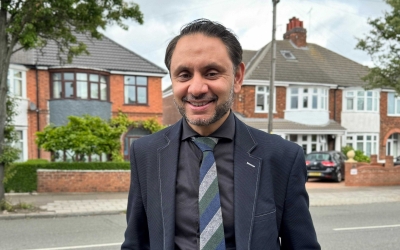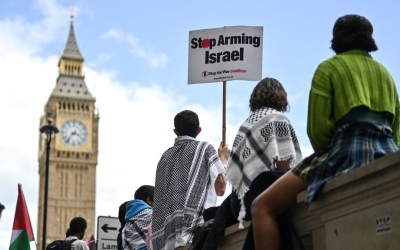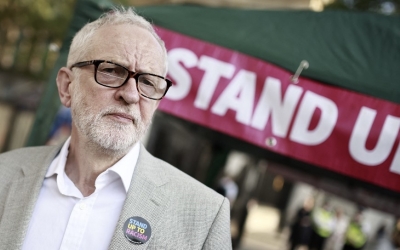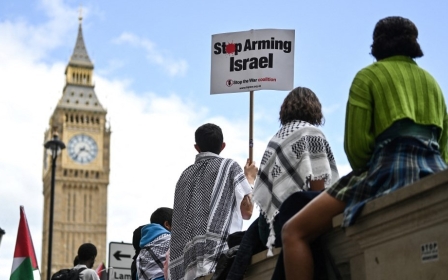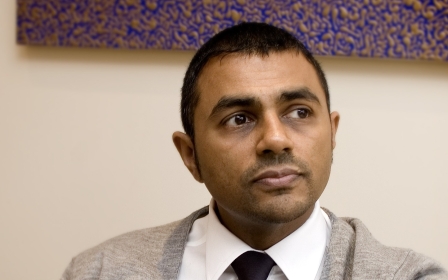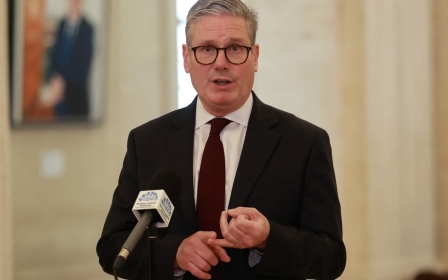Why are British Muslim voters being accused of ‘sectarian’ politics?
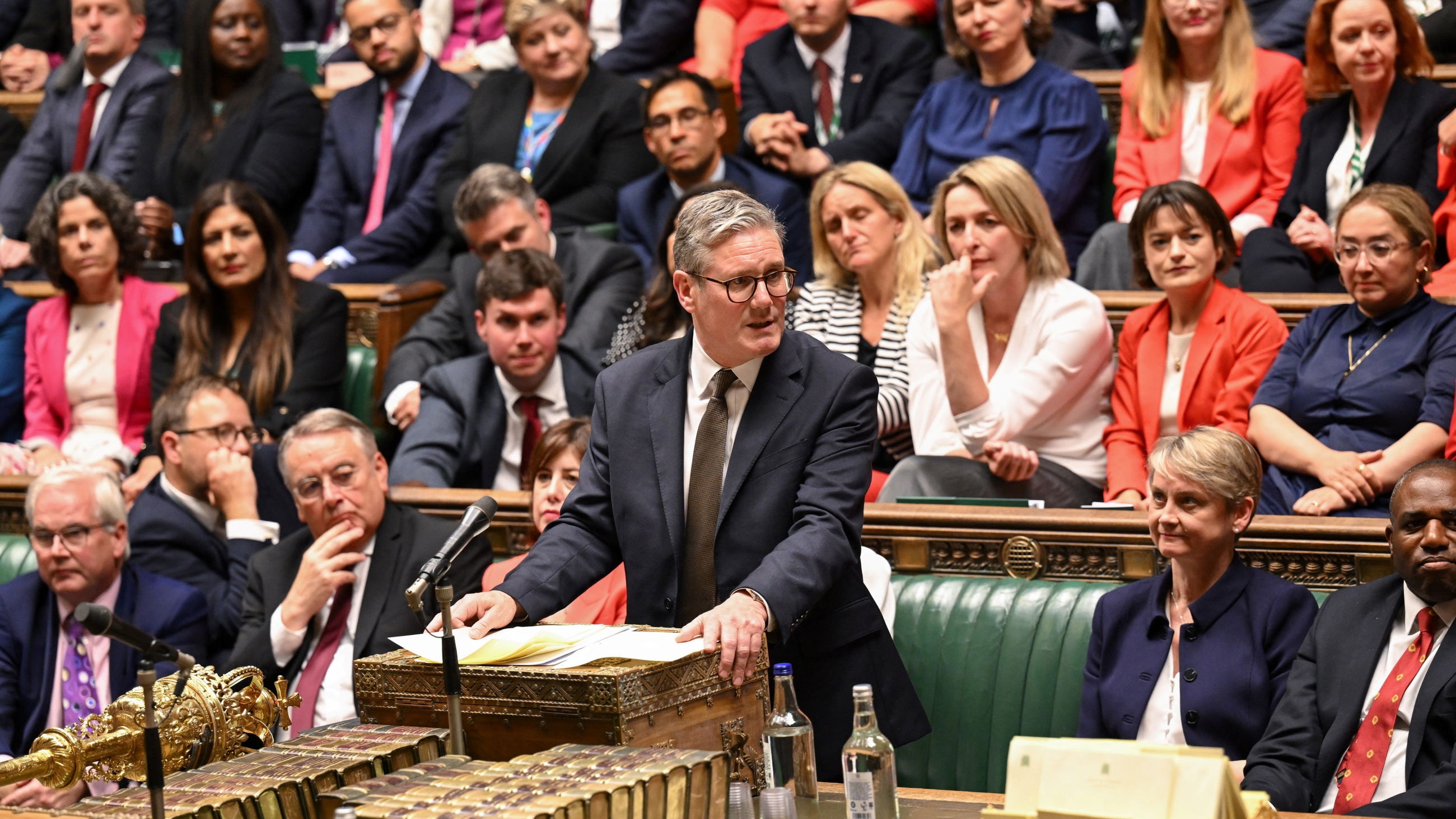
The UK Labour Party won a landslide majority last week, but its vote share fell sharply in constituencies where Muslims made up a greater percentage of voters.
Some commentators have since described the trend as evidence of "sectarian" politics, but academics and Muslim civil society groups told Middle East Eye the narrative was false and an attempt at fear-mongering.
Analysis shared with MEE showed that in the 20 constituencies with the highest proportion of Muslims, the party’s share of the vote dropped by between 15 percent and 45 percent. Labour's early support for Israel’s war on Gaza is likely to have been the most significant factor.
The upshot was that five independent candidates were elected on pro-Palestinian platforms, while several Labour MPs retained their seats with significantly reduced majorities.
The dust had barely settled on the results when many commentators began denouncing the election of independent candidates as evidence of “sectarian” politics.
New MEE newsletter: Jerusalem Dispatch
Sign up to get the latest insights and analysis on Israel-Palestine, alongside Turkey Unpacked and other MEE newsletters
Sectarianism is commonly defined as “narrow‐minded adherence to a particular sect,” usually ethnic or religious.
Journalist Zoe Strimpel said on 6 July that Britain was “succumbing to sectarianism”.
“As a Jew, this election was always to be feared; it’s just that the enemy is not Labour anymore, but the 'independent', 'Palestine solidarity' candidates,” she wrote in the Telegraph.
“It’s hard not to feel a pulse of fear and loathing when one sees how our once-great liberal democracy has been hijacked to serve the agendas of people who appear to show solidarity with a regime heading an army of caliphatic Islamist butchers.”
Jake Wallis Simons, editor of the Jewish Chronicle, accused the campaign The Muslim Vote of operating on “sectarian principles”, saying that independent candidates “owed their allegiances purely to religious and ethnic interests”.
“Islamist intimidation is poisoning our politics,” said television executive Danny Cohen.
Meanwhile Khalid Mahmood, the former Labour MP for Birmingham Perry Barr unseated by independent Ayoub Khan, said there had been a “completely fabricated agenda” against him.
Nigel Farage, leader of Reform UK and newly elected MP for Clacton, has warned repeatedly for months that “sectarian politics” was threatening Britain.
Before the election, former Conservative leader Iain Duncan Smith described The Muslim Vote campaign as a threat to democracy, while Conservative MP Andrew Percy labelled it as a threat to national security and democratic values.
But are Muslim voting patterns actually evidence of sectarianism?
'Muslims voted for humanitarianism'
Shockat Adam, the new independent MP for Leicester South who unseated Labour’s shadow cabinet minister Jonathan Ashworth, told MEE during the campaign: “I love this country and that is why we have to make sure that we have a voice representing everybody.”
MEE watched Adam campaign in a popular Portugese cafe in his constituency.
“We are living in a world now where people sometimes try to divide us,” he told the crowd of mainly Portugese punters, “and that’s why it’s so important that we all work together to make sure we all stay united.”
One Muslim resident in Leicester South, who preferred not to be named, told MEE after the election that he believed Adam “understood what the Gaza issue meant to the majority of people".
'Claims of this nature are rarely levelled against any other faith or ethnic group that engages electorally'
- Zara Mohammed, Muslim Council of Britain
“But he also shared a lot of passion for restoring the failing NHS and social care. That’s why I voted for him.”
He described accusations of sectarianism as “Islamophobia”, adding: “Muslims voted for humanitarianism. The media are trying to portray Muslims as extremists who don’t care about British values.”
Amy, a young Leicester South constituent who is not Muslim, told MEE she voted for the Green Party but was “pleasantly surprised when Shockat won”.
“The area I’ve lived in my whole life finally will have someone who actually represents them,” she said. “Jonathan Ashworth and Labour learnt there can be consequences to bigoted speech, and that Muslims and minority communities will stand up and exercise their democratic right to vote.”
Zara Mohammed, head of the Muslim Council of Britain, told MEE that claims of Muslim sectarianism were “simply another way to push a narrative that demonises Muslim groups”.
“Claims of this nature are rarely levelled against any other faith or ethnic group that engages electorally.”
Dr Khadijah Elshayyal, a research fellow at the University of Edinburgh, said: “Claims of sectarianism and the associated fear-mongering are made in bad faith and emanate from an inherent suspicion and unease with Muslim political agency.”
Muslims voted for diverse parties
Prime Minister Keir Starmer appeared dismissive when he was asked about his relationship with Muslim voters after the election.
He said: "We have a strong mandate but we did not secure the votes. We will address that, whereas I don't think there is anything to dispute the mandate we have, and that it's a mandate for change, for renewal and for politics as public service."
By contrast, Health Secretary Wes Streeting - who was 528 votes away from being unseated by British-Palestinian independent Leanne Mohammed - said that “Gaza has been a real issue for the Labour Party at this election”.
Taken as a whole, the election results show that Muslims have not abandoned Labour, with many still voting for the party.
Contrary to some of the media narratives, this election may in fact show that Muslims are now less likely to vote as a bloc.
More than 80 percent of Muslims voted for Labour when Jeremy Corbyn was leader, between 2015 and 2020.
Not anymore. At this general election, Muslims appeared to vote for a diverse range of parties and candidates.
A YouGov poll before the election found that an unprecedented 29 percent of Bangladeshis and Pakistanis intended to vote for Green Party candidates, with 44 percent opting for Labour.
The left-wing Green Party campaigned heavily in several areas on its support for a ceasefire in Gaza and the suspension of arms sales to Israel. Carla Denyer, co-leader of the party, won in Bristol Central on a pro-Palestinian platform.
'Palestine was on the ballot'
The MCB’s Zara Mohammed said that while Muslims voted “across party lines”, it was evident that many voted on the issue of Gaza.
“This reflects a broader societal disappointment and disillusionment with political parties' responses to Gaza.”
Denyer and some other candidates who campaigned on pro-Palestinian platforms received votes from non-Muslims, which complicated the notion that Gaza was a sectarian issue.
'Muslims have specific political demands and are ensuring they are heard'
- Fatima Rajina, researcher
Labour leader Jeremy Corbyn, re-elected as an independent in Islington North, was an example of that. “Palestine was on the ballot,” he told MEE after the vote. In his seat, only around 13 percent of residents are Muslim.
Starmer himself saw his vote share significantly slashed in Holborn and St Pancras, where Jewish South African independent and former Nelson Mandela ally Andrew Feinstein campaigned heavily on Gaza.
Neither Denyer, Corbyn nor Feinstein are Muslim.
Dr Fatima Rajina, a senior research fellow at De Montfort University, told MEE: “What we are seeing is Muslims coming together and utilising their democratic right to participate in politics. Muslims have specific political demands and are ensuring they are heard but now this is being met with Islamophobia and dog-whistle politics.”
Elshayyal said: “While political consciousness among Muslims isn’t new per se, what we saw in this election has been a more articulate political literacy which is keen to make a poor electoral system that is structurally skewed against minorities and dissenting voters, deliver some kind of result.”
Looking ahead, Elshayyal thought it was unlikely that Labour would consider “fruitful engagement” with British Muslims as a priority, “but a first step would be to reach out to these communities and seriously hear their concerns” - and not just those Muslims who support the government’s agenda.
Mohammed said that Labour should “rebuild trust with Muslim communities” through “sincere engagement”.
Meanwhile, Rajina saw hope in the fact that Muslims were “re-engaging with party politics differently”.
“The current shift with the independent MPs is something we should all pay attention to,” she said. “Because not only is it politically invigorating but it showcases what organising and building a people’s movement can look like.
“It provides hope that there are alternative ways of doing politics away from party politics.”
Middle East Eye delivers independent and unrivalled coverage and analysis of the Middle East, North Africa and beyond. To learn more about republishing this content and the associated fees, please fill out this form. More about MEE can be found here.


